Laws and Ethics in Health: Importance of Professional Conduct in Patient Care
VerifiedAdded on 2022/11/14
|10
|2761
|494
AI Summary
This article discusses the importance of ethics and law in healthcare, focusing on the role of nurses and other healthcare professionals in ensuring patient safety and positive health outcomes. It covers topics such as codes of ethics, legal issues, negligence, confidentiality, informed consent, and patient-centered care. The article also presents a case study of Ashley and how legal and ethical issues were addressed in her care.
Contribute Materials
Your contribution can guide someone’s learning journey. Share your
documents today.
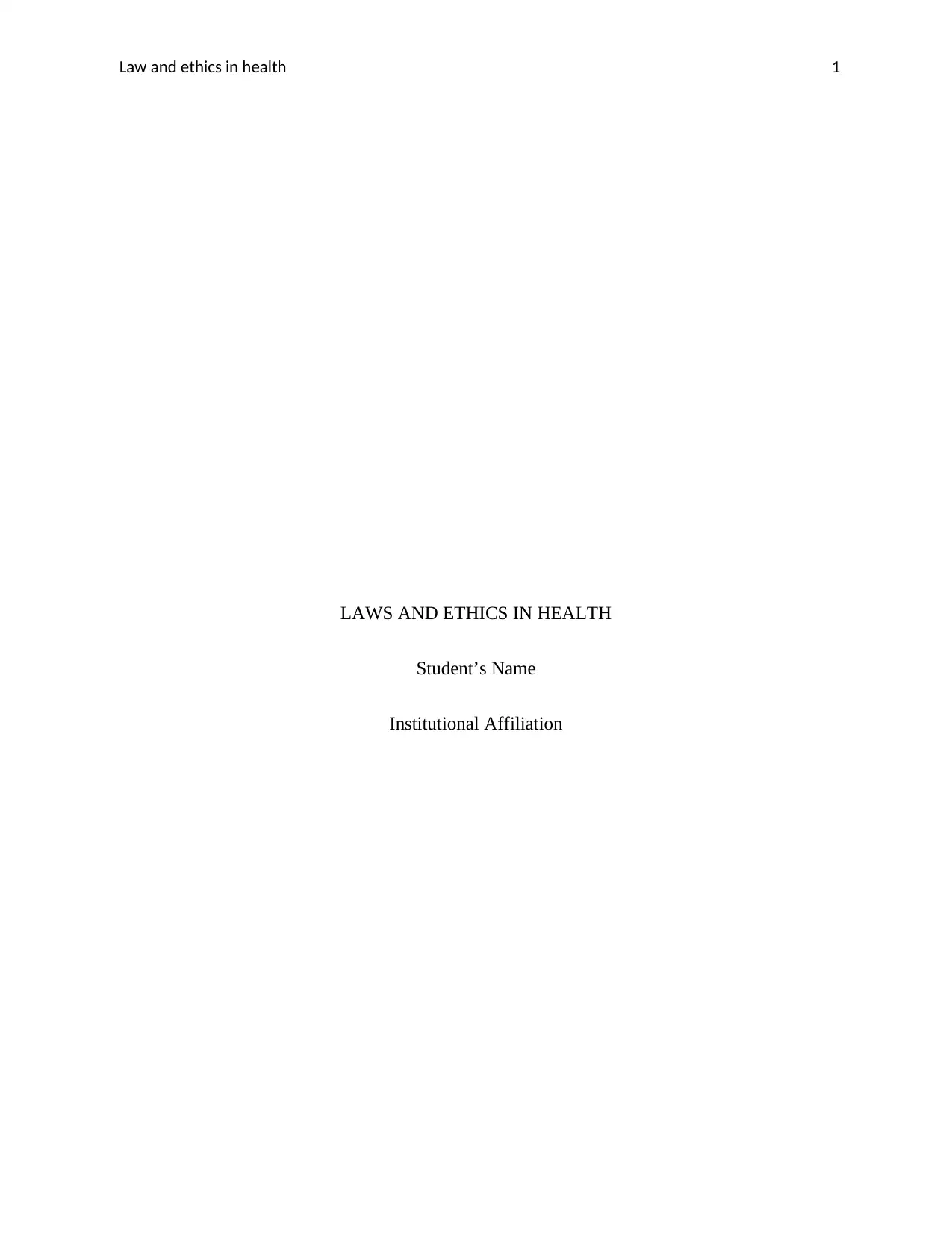
Law and ethics in health 1
LAWS AND ETHICS IN HEALTH
Student’s Name
Institutional Affiliation
LAWS AND ETHICS IN HEALTH
Student’s Name
Institutional Affiliation
Secure Best Marks with AI Grader
Need help grading? Try our AI Grader for instant feedback on your assignments.
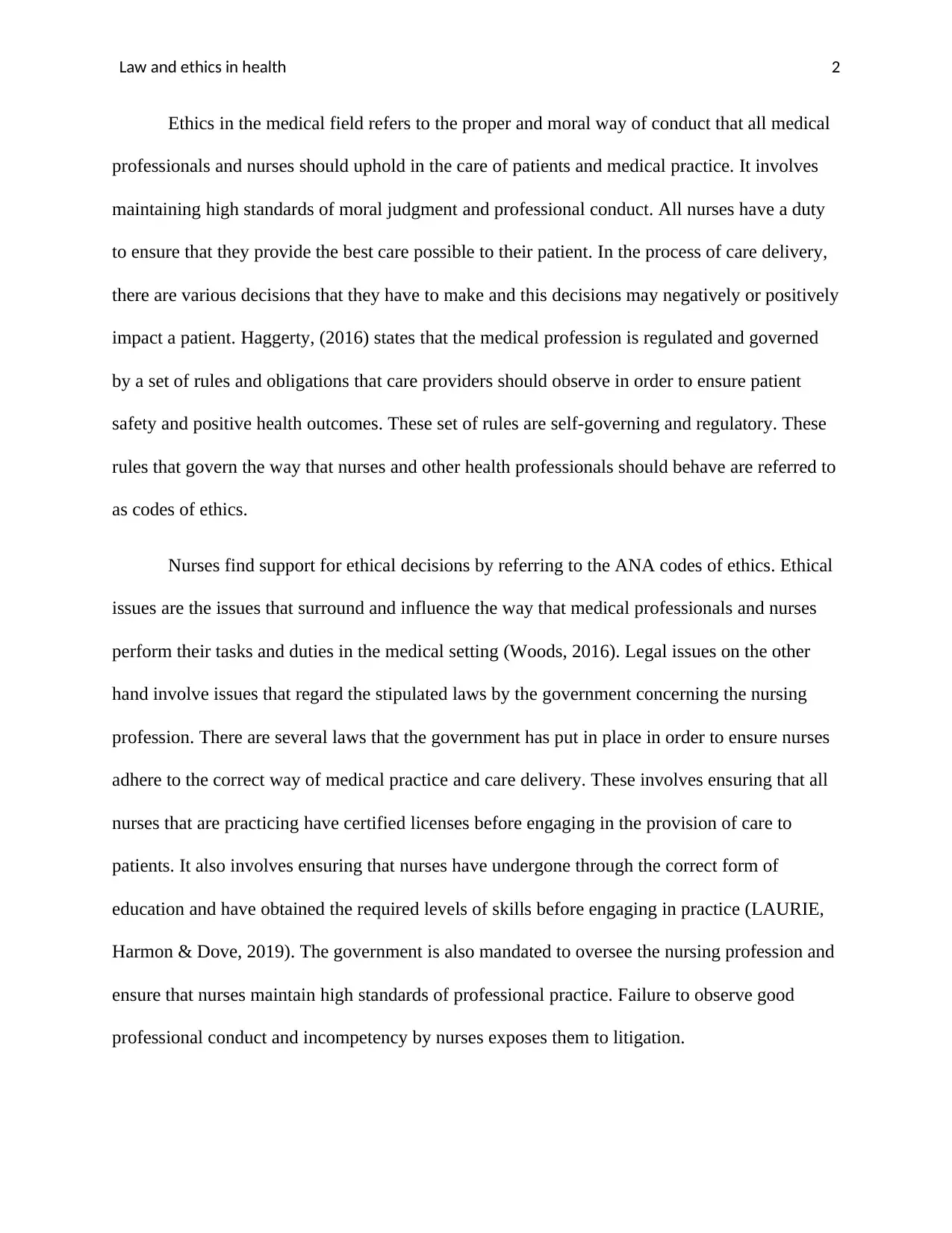
Law and ethics in health 2
Ethics in the medical field refers to the proper and moral way of conduct that all medical
professionals and nurses should uphold in the care of patients and medical practice. It involves
maintaining high standards of moral judgment and professional conduct. All nurses have a duty
to ensure that they provide the best care possible to their patient. In the process of care delivery,
there are various decisions that they have to make and this decisions may negatively or positively
impact a patient. Haggerty, (2016) states that the medical profession is regulated and governed
by a set of rules and obligations that care providers should observe in order to ensure patient
safety and positive health outcomes. These set of rules are self-governing and regulatory. These
rules that govern the way that nurses and other health professionals should behave are referred to
as codes of ethics.
Nurses find support for ethical decisions by referring to the ANA codes of ethics. Ethical
issues are the issues that surround and influence the way that medical professionals and nurses
perform their tasks and duties in the medical setting (Woods, 2016). Legal issues on the other
hand involve issues that regard the stipulated laws by the government concerning the nursing
profession. There are several laws that the government has put in place in order to ensure nurses
adhere to the correct way of medical practice and care delivery. These involves ensuring that all
nurses that are practicing have certified licenses before engaging in the provision of care to
patients. It also involves ensuring that nurses have undergone through the correct form of
education and have obtained the required levels of skills before engaging in practice (LAURIE,
Harmon & Dove, 2019). The government is also mandated to oversee the nursing profession and
ensure that nurses maintain high standards of professional practice. Failure to observe good
professional conduct and incompetency by nurses exposes them to litigation.
Ethics in the medical field refers to the proper and moral way of conduct that all medical
professionals and nurses should uphold in the care of patients and medical practice. It involves
maintaining high standards of moral judgment and professional conduct. All nurses have a duty
to ensure that they provide the best care possible to their patient. In the process of care delivery,
there are various decisions that they have to make and this decisions may negatively or positively
impact a patient. Haggerty, (2016) states that the medical profession is regulated and governed
by a set of rules and obligations that care providers should observe in order to ensure patient
safety and positive health outcomes. These set of rules are self-governing and regulatory. These
rules that govern the way that nurses and other health professionals should behave are referred to
as codes of ethics.
Nurses find support for ethical decisions by referring to the ANA codes of ethics. Ethical
issues are the issues that surround and influence the way that medical professionals and nurses
perform their tasks and duties in the medical setting (Woods, 2016). Legal issues on the other
hand involve issues that regard the stipulated laws by the government concerning the nursing
profession. There are several laws that the government has put in place in order to ensure nurses
adhere to the correct way of medical practice and care delivery. These involves ensuring that all
nurses that are practicing have certified licenses before engaging in the provision of care to
patients. It also involves ensuring that nurses have undergone through the correct form of
education and have obtained the required levels of skills before engaging in practice (LAURIE,
Harmon & Dove, 2019). The government is also mandated to oversee the nursing profession and
ensure that nurses maintain high standards of professional practice. Failure to observe good
professional conduct and incompetency by nurses exposes them to litigation.
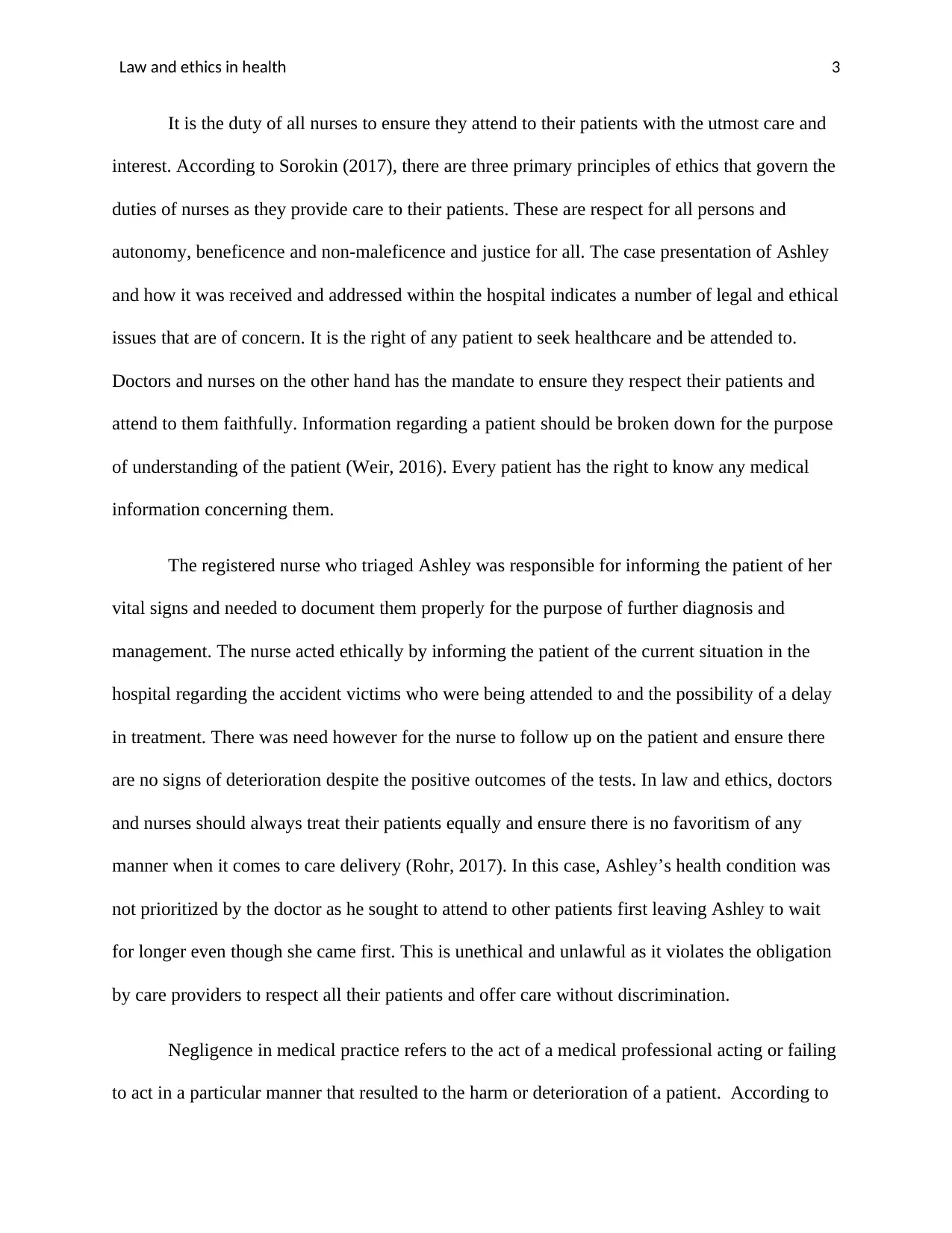
Law and ethics in health 3
It is the duty of all nurses to ensure they attend to their patients with the utmost care and
interest. According to Sorokin (2017), there are three primary principles of ethics that govern the
duties of nurses as they provide care to their patients. These are respect for all persons and
autonomy, beneficence and non-maleficence and justice for all. The case presentation of Ashley
and how it was received and addressed within the hospital indicates a number of legal and ethical
issues that are of concern. It is the right of any patient to seek healthcare and be attended to.
Doctors and nurses on the other hand has the mandate to ensure they respect their patients and
attend to them faithfully. Information regarding a patient should be broken down for the purpose
of understanding of the patient (Weir, 2016). Every patient has the right to know any medical
information concerning them.
The registered nurse who triaged Ashley was responsible for informing the patient of her
vital signs and needed to document them properly for the purpose of further diagnosis and
management. The nurse acted ethically by informing the patient of the current situation in the
hospital regarding the accident victims who were being attended to and the possibility of a delay
in treatment. There was need however for the nurse to follow up on the patient and ensure there
are no signs of deterioration despite the positive outcomes of the tests. In law and ethics, doctors
and nurses should always treat their patients equally and ensure there is no favoritism of any
manner when it comes to care delivery (Rohr, 2017). In this case, Ashley’s health condition was
not prioritized by the doctor as he sought to attend to other patients first leaving Ashley to wait
for longer even though she came first. This is unethical and unlawful as it violates the obligation
by care providers to respect all their patients and offer care without discrimination.
Negligence in medical practice refers to the act of a medical professional acting or failing
to act in a particular manner that resulted to the harm or deterioration of a patient. According to
It is the duty of all nurses to ensure they attend to their patients with the utmost care and
interest. According to Sorokin (2017), there are three primary principles of ethics that govern the
duties of nurses as they provide care to their patients. These are respect for all persons and
autonomy, beneficence and non-maleficence and justice for all. The case presentation of Ashley
and how it was received and addressed within the hospital indicates a number of legal and ethical
issues that are of concern. It is the right of any patient to seek healthcare and be attended to.
Doctors and nurses on the other hand has the mandate to ensure they respect their patients and
attend to them faithfully. Information regarding a patient should be broken down for the purpose
of understanding of the patient (Weir, 2016). Every patient has the right to know any medical
information concerning them.
The registered nurse who triaged Ashley was responsible for informing the patient of her
vital signs and needed to document them properly for the purpose of further diagnosis and
management. The nurse acted ethically by informing the patient of the current situation in the
hospital regarding the accident victims who were being attended to and the possibility of a delay
in treatment. There was need however for the nurse to follow up on the patient and ensure there
are no signs of deterioration despite the positive outcomes of the tests. In law and ethics, doctors
and nurses should always treat their patients equally and ensure there is no favoritism of any
manner when it comes to care delivery (Rohr, 2017). In this case, Ashley’s health condition was
not prioritized by the doctor as he sought to attend to other patients first leaving Ashley to wait
for longer even though she came first. This is unethical and unlawful as it violates the obligation
by care providers to respect all their patients and offer care without discrimination.
Negligence in medical practice refers to the act of a medical professional acting or failing
to act in a particular manner that resulted to the harm or deterioration of a patient. According to
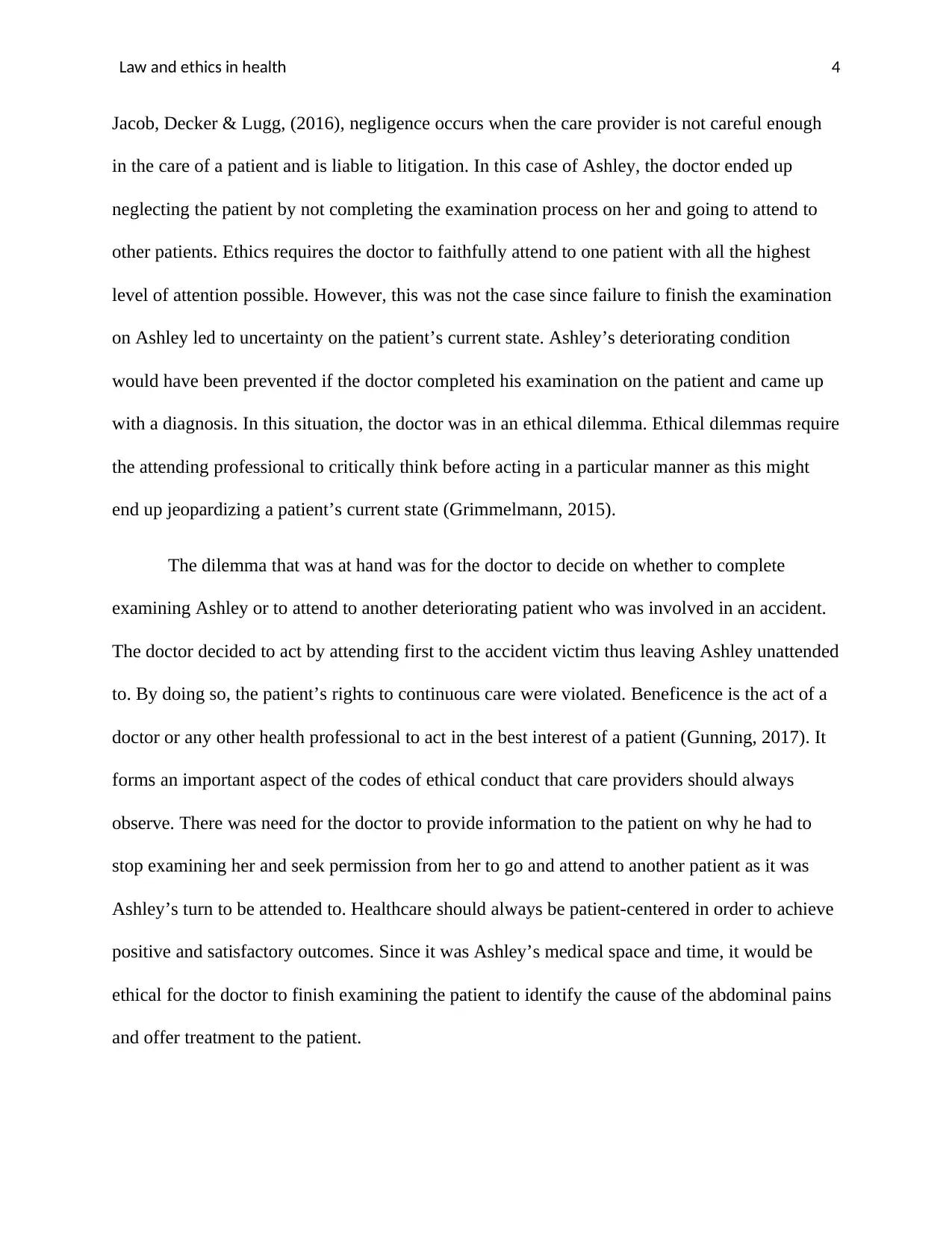
Law and ethics in health 4
Jacob, Decker & Lugg, (2016), negligence occurs when the care provider is not careful enough
in the care of a patient and is liable to litigation. In this case of Ashley, the doctor ended up
neglecting the patient by not completing the examination process on her and going to attend to
other patients. Ethics requires the doctor to faithfully attend to one patient with all the highest
level of attention possible. However, this was not the case since failure to finish the examination
on Ashley led to uncertainty on the patient’s current state. Ashley’s deteriorating condition
would have been prevented if the doctor completed his examination on the patient and came up
with a diagnosis. In this situation, the doctor was in an ethical dilemma. Ethical dilemmas require
the attending professional to critically think before acting in a particular manner as this might
end up jeopardizing a patient’s current state (Grimmelmann, 2015).
The dilemma that was at hand was for the doctor to decide on whether to complete
examining Ashley or to attend to another deteriorating patient who was involved in an accident.
The doctor decided to act by attending first to the accident victim thus leaving Ashley unattended
to. By doing so, the patient’s rights to continuous care were violated. Beneficence is the act of a
doctor or any other health professional to act in the best interest of a patient (Gunning, 2017). It
forms an important aspect of the codes of ethical conduct that care providers should always
observe. There was need for the doctor to provide information to the patient on why he had to
stop examining her and seek permission from her to go and attend to another patient as it was
Ashley’s turn to be attended to. Healthcare should always be patient-centered in order to achieve
positive and satisfactory outcomes. Since it was Ashley’s medical space and time, it would be
ethical for the doctor to finish examining the patient to identify the cause of the abdominal pains
and offer treatment to the patient.
Jacob, Decker & Lugg, (2016), negligence occurs when the care provider is not careful enough
in the care of a patient and is liable to litigation. In this case of Ashley, the doctor ended up
neglecting the patient by not completing the examination process on her and going to attend to
other patients. Ethics requires the doctor to faithfully attend to one patient with all the highest
level of attention possible. However, this was not the case since failure to finish the examination
on Ashley led to uncertainty on the patient’s current state. Ashley’s deteriorating condition
would have been prevented if the doctor completed his examination on the patient and came up
with a diagnosis. In this situation, the doctor was in an ethical dilemma. Ethical dilemmas require
the attending professional to critically think before acting in a particular manner as this might
end up jeopardizing a patient’s current state (Grimmelmann, 2015).
The dilemma that was at hand was for the doctor to decide on whether to complete
examining Ashley or to attend to another deteriorating patient who was involved in an accident.
The doctor decided to act by attending first to the accident victim thus leaving Ashley unattended
to. By doing so, the patient’s rights to continuous care were violated. Beneficence is the act of a
doctor or any other health professional to act in the best interest of a patient (Gunning, 2017). It
forms an important aspect of the codes of ethical conduct that care providers should always
observe. There was need for the doctor to provide information to the patient on why he had to
stop examining her and seek permission from her to go and attend to another patient as it was
Ashley’s turn to be attended to. Healthcare should always be patient-centered in order to achieve
positive and satisfactory outcomes. Since it was Ashley’s medical space and time, it would be
ethical for the doctor to finish examining the patient to identify the cause of the abdominal pains
and offer treatment to the patient.
Secure Best Marks with AI Grader
Need help grading? Try our AI Grader for instant feedback on your assignments.
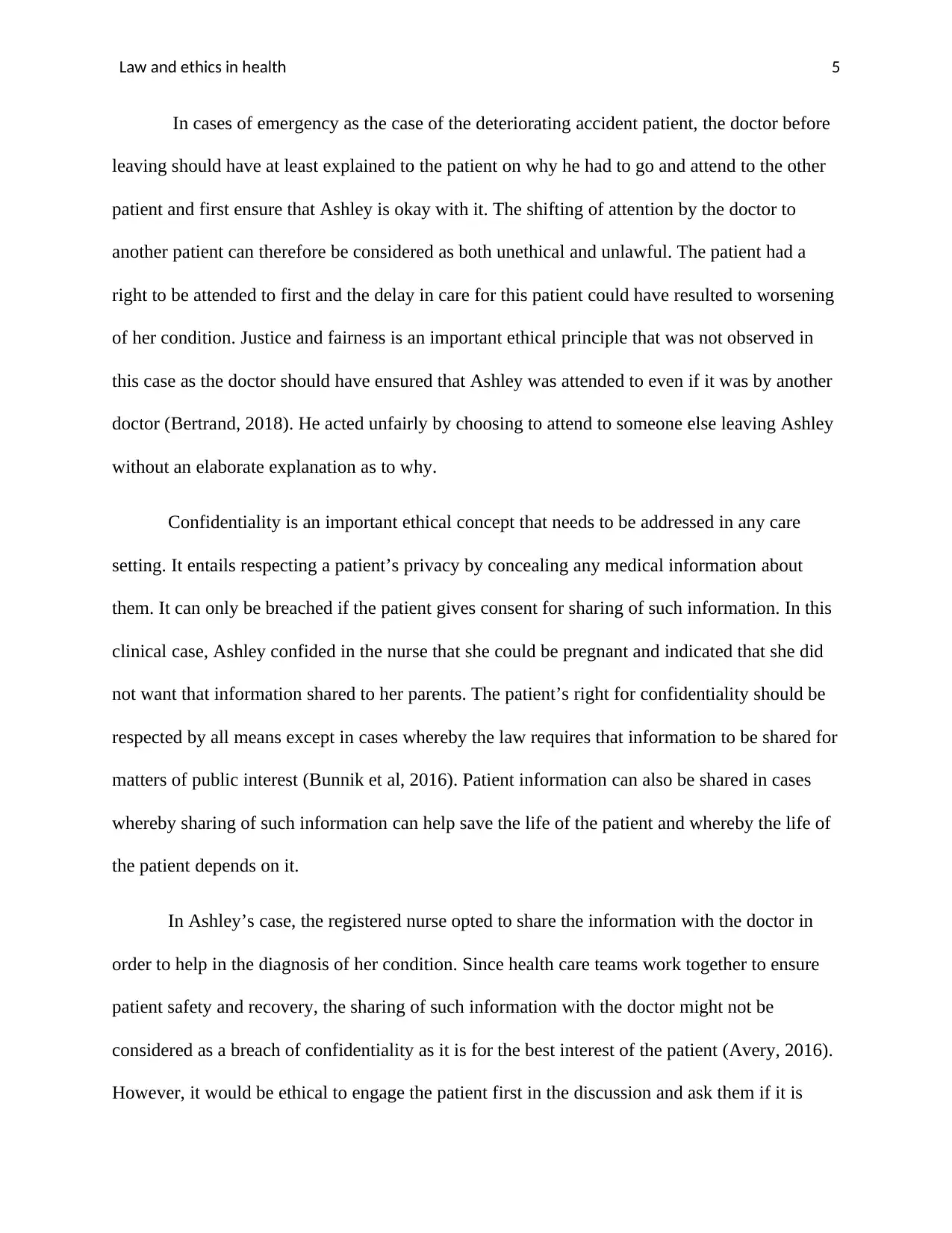
Law and ethics in health 5
In cases of emergency as the case of the deteriorating accident patient, the doctor before
leaving should have at least explained to the patient on why he had to go and attend to the other
patient and first ensure that Ashley is okay with it. The shifting of attention by the doctor to
another patient can therefore be considered as both unethical and unlawful. The patient had a
right to be attended to first and the delay in care for this patient could have resulted to worsening
of her condition. Justice and fairness is an important ethical principle that was not observed in
this case as the doctor should have ensured that Ashley was attended to even if it was by another
doctor (Bertrand, 2018). He acted unfairly by choosing to attend to someone else leaving Ashley
without an elaborate explanation as to why.
Confidentiality is an important ethical concept that needs to be addressed in any care
setting. It entails respecting a patient’s privacy by concealing any medical information about
them. It can only be breached if the patient gives consent for sharing of such information. In this
clinical case, Ashley confided in the nurse that she could be pregnant and indicated that she did
not want that information shared to her parents. The patient’s right for confidentiality should be
respected by all means except in cases whereby the law requires that information to be shared for
matters of public interest (Bunnik et al, 2016). Patient information can also be shared in cases
whereby sharing of such information can help save the life of the patient and whereby the life of
the patient depends on it.
In Ashley’s case, the registered nurse opted to share the information with the doctor in
order to help in the diagnosis of her condition. Since health care teams work together to ensure
patient safety and recovery, the sharing of such information with the doctor might not be
considered as a breach of confidentiality as it is for the best interest of the patient (Avery, 2016).
However, it would be ethical to engage the patient first in the discussion and ask them if it is
In cases of emergency as the case of the deteriorating accident patient, the doctor before
leaving should have at least explained to the patient on why he had to go and attend to the other
patient and first ensure that Ashley is okay with it. The shifting of attention by the doctor to
another patient can therefore be considered as both unethical and unlawful. The patient had a
right to be attended to first and the delay in care for this patient could have resulted to worsening
of her condition. Justice and fairness is an important ethical principle that was not observed in
this case as the doctor should have ensured that Ashley was attended to even if it was by another
doctor (Bertrand, 2018). He acted unfairly by choosing to attend to someone else leaving Ashley
without an elaborate explanation as to why.
Confidentiality is an important ethical concept that needs to be addressed in any care
setting. It entails respecting a patient’s privacy by concealing any medical information about
them. It can only be breached if the patient gives consent for sharing of such information. In this
clinical case, Ashley confided in the nurse that she could be pregnant and indicated that she did
not want that information shared to her parents. The patient’s right for confidentiality should be
respected by all means except in cases whereby the law requires that information to be shared for
matters of public interest (Bunnik et al, 2016). Patient information can also be shared in cases
whereby sharing of such information can help save the life of the patient and whereby the life of
the patient depends on it.
In Ashley’s case, the registered nurse opted to share the information with the doctor in
order to help in the diagnosis of her condition. Since health care teams work together to ensure
patient safety and recovery, the sharing of such information with the doctor might not be
considered as a breach of confidentiality as it is for the best interest of the patient (Avery, 2016).
However, it would be ethical to engage the patient first in the discussion and ask them if it is
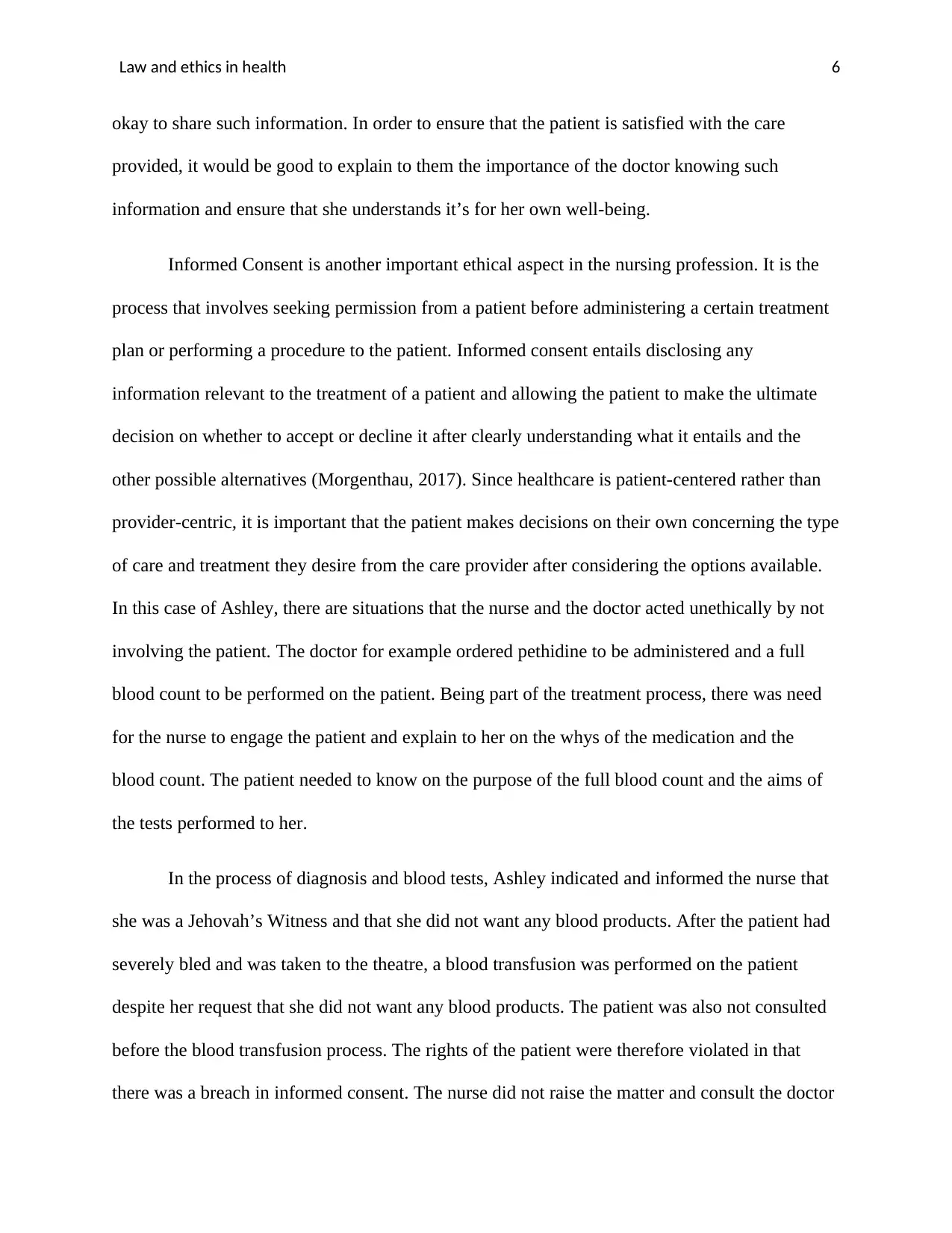
Law and ethics in health 6
okay to share such information. In order to ensure that the patient is satisfied with the care
provided, it would be good to explain to them the importance of the doctor knowing such
information and ensure that she understands it’s for her own well-being.
Informed Consent is another important ethical aspect in the nursing profession. It is the
process that involves seeking permission from a patient before administering a certain treatment
plan or performing a procedure to the patient. Informed consent entails disclosing any
information relevant to the treatment of a patient and allowing the patient to make the ultimate
decision on whether to accept or decline it after clearly understanding what it entails and the
other possible alternatives (Morgenthau, 2017). Since healthcare is patient-centered rather than
provider-centric, it is important that the patient makes decisions on their own concerning the type
of care and treatment they desire from the care provider after considering the options available.
In this case of Ashley, there are situations that the nurse and the doctor acted unethically by not
involving the patient. The doctor for example ordered pethidine to be administered and a full
blood count to be performed on the patient. Being part of the treatment process, there was need
for the nurse to engage the patient and explain to her on the whys of the medication and the
blood count. The patient needed to know on the purpose of the full blood count and the aims of
the tests performed to her.
In the process of diagnosis and blood tests, Ashley indicated and informed the nurse that
she was a Jehovah’s Witness and that she did not want any blood products. After the patient had
severely bled and was taken to the theatre, a blood transfusion was performed on the patient
despite her request that she did not want any blood products. The patient was also not consulted
before the blood transfusion process. The rights of the patient were therefore violated in that
there was a breach in informed consent. The nurse did not raise the matter and consult the doctor
okay to share such information. In order to ensure that the patient is satisfied with the care
provided, it would be good to explain to them the importance of the doctor knowing such
information and ensure that she understands it’s for her own well-being.
Informed Consent is another important ethical aspect in the nursing profession. It is the
process that involves seeking permission from a patient before administering a certain treatment
plan or performing a procedure to the patient. Informed consent entails disclosing any
information relevant to the treatment of a patient and allowing the patient to make the ultimate
decision on whether to accept or decline it after clearly understanding what it entails and the
other possible alternatives (Morgenthau, 2017). Since healthcare is patient-centered rather than
provider-centric, it is important that the patient makes decisions on their own concerning the type
of care and treatment they desire from the care provider after considering the options available.
In this case of Ashley, there are situations that the nurse and the doctor acted unethically by not
involving the patient. The doctor for example ordered pethidine to be administered and a full
blood count to be performed on the patient. Being part of the treatment process, there was need
for the nurse to engage the patient and explain to her on the whys of the medication and the
blood count. The patient needed to know on the purpose of the full blood count and the aims of
the tests performed to her.
In the process of diagnosis and blood tests, Ashley indicated and informed the nurse that
she was a Jehovah’s Witness and that she did not want any blood products. After the patient had
severely bled and was taken to the theatre, a blood transfusion was performed on the patient
despite her request that she did not want any blood products. The patient was also not consulted
before the blood transfusion process. The rights of the patient were therefore violated in that
there was a breach in informed consent. The nurse did not raise the matter and consult the doctor
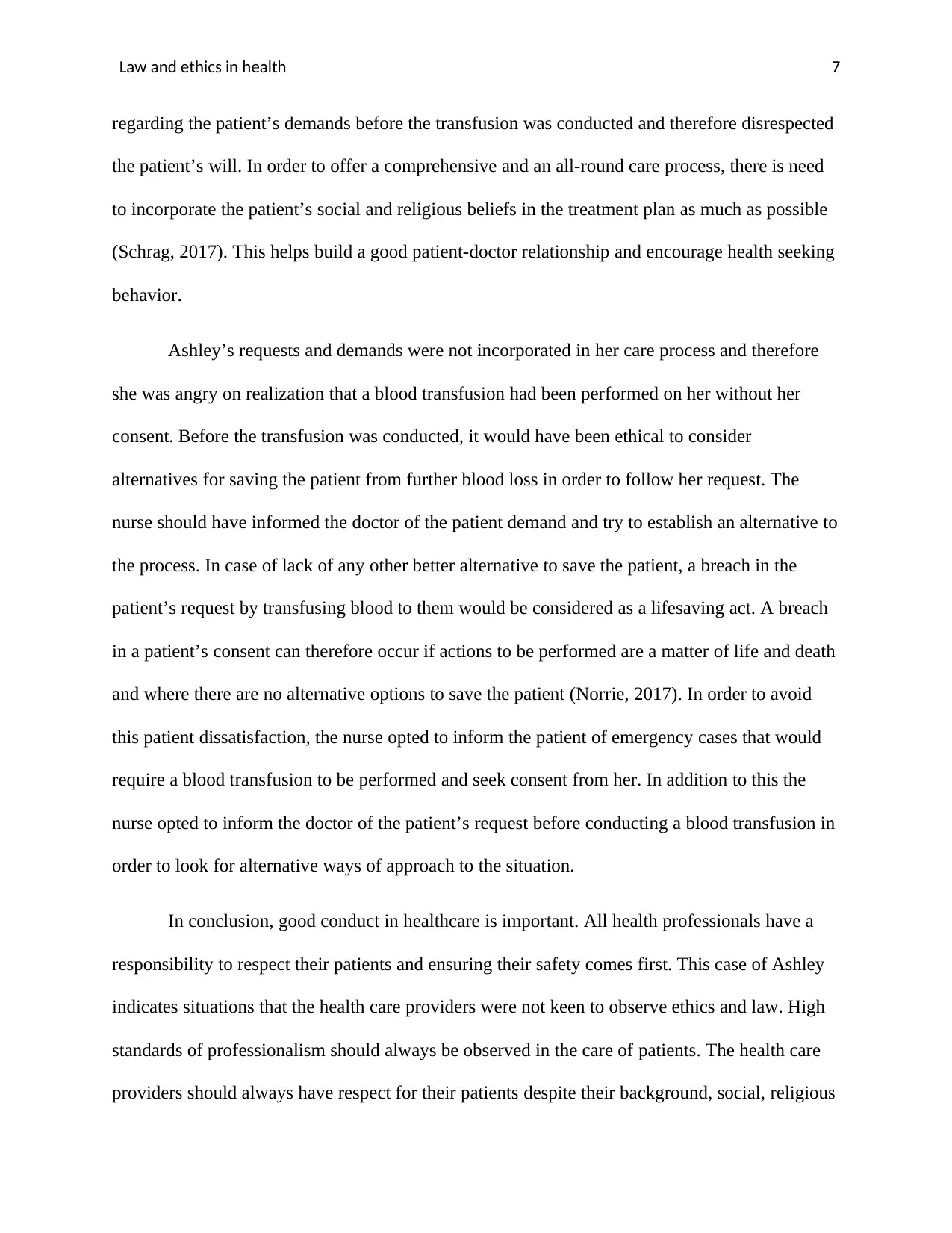
Law and ethics in health 7
regarding the patient’s demands before the transfusion was conducted and therefore disrespected
the patient’s will. In order to offer a comprehensive and an all-round care process, there is need
to incorporate the patient’s social and religious beliefs in the treatment plan as much as possible
(Schrag, 2017). This helps build a good patient-doctor relationship and encourage health seeking
behavior.
Ashley’s requests and demands were not incorporated in her care process and therefore
she was angry on realization that a blood transfusion had been performed on her without her
consent. Before the transfusion was conducted, it would have been ethical to consider
alternatives for saving the patient from further blood loss in order to follow her request. The
nurse should have informed the doctor of the patient demand and try to establish an alternative to
the process. In case of lack of any other better alternative to save the patient, a breach in the
patient’s request by transfusing blood to them would be considered as a lifesaving act. A breach
in a patient’s consent can therefore occur if actions to be performed are a matter of life and death
and where there are no alternative options to save the patient (Norrie, 2017). In order to avoid
this patient dissatisfaction, the nurse opted to inform the patient of emergency cases that would
require a blood transfusion to be performed and seek consent from her. In addition to this the
nurse opted to inform the doctor of the patient’s request before conducting a blood transfusion in
order to look for alternative ways of approach to the situation.
In conclusion, good conduct in healthcare is important. All health professionals have a
responsibility to respect their patients and ensuring their safety comes first. This case of Ashley
indicates situations that the health care providers were not keen to observe ethics and law. High
standards of professionalism should always be observed in the care of patients. The health care
providers should always have respect for their patients despite their background, social, religious
regarding the patient’s demands before the transfusion was conducted and therefore disrespected
the patient’s will. In order to offer a comprehensive and an all-round care process, there is need
to incorporate the patient’s social and religious beliefs in the treatment plan as much as possible
(Schrag, 2017). This helps build a good patient-doctor relationship and encourage health seeking
behavior.
Ashley’s requests and demands were not incorporated in her care process and therefore
she was angry on realization that a blood transfusion had been performed on her without her
consent. Before the transfusion was conducted, it would have been ethical to consider
alternatives for saving the patient from further blood loss in order to follow her request. The
nurse should have informed the doctor of the patient demand and try to establish an alternative to
the process. In case of lack of any other better alternative to save the patient, a breach in the
patient’s request by transfusing blood to them would be considered as a lifesaving act. A breach
in a patient’s consent can therefore occur if actions to be performed are a matter of life and death
and where there are no alternative options to save the patient (Norrie, 2017). In order to avoid
this patient dissatisfaction, the nurse opted to inform the patient of emergency cases that would
require a blood transfusion to be performed and seek consent from her. In addition to this the
nurse opted to inform the doctor of the patient’s request before conducting a blood transfusion in
order to look for alternative ways of approach to the situation.
In conclusion, good conduct in healthcare is important. All health professionals have a
responsibility to respect their patients and ensuring their safety comes first. This case of Ashley
indicates situations that the health care providers were not keen to observe ethics and law. High
standards of professionalism should always be observed in the care of patients. The health care
providers should always have respect for their patients despite their background, social, religious
Paraphrase This Document
Need a fresh take? Get an instant paraphrase of this document with our AI Paraphraser
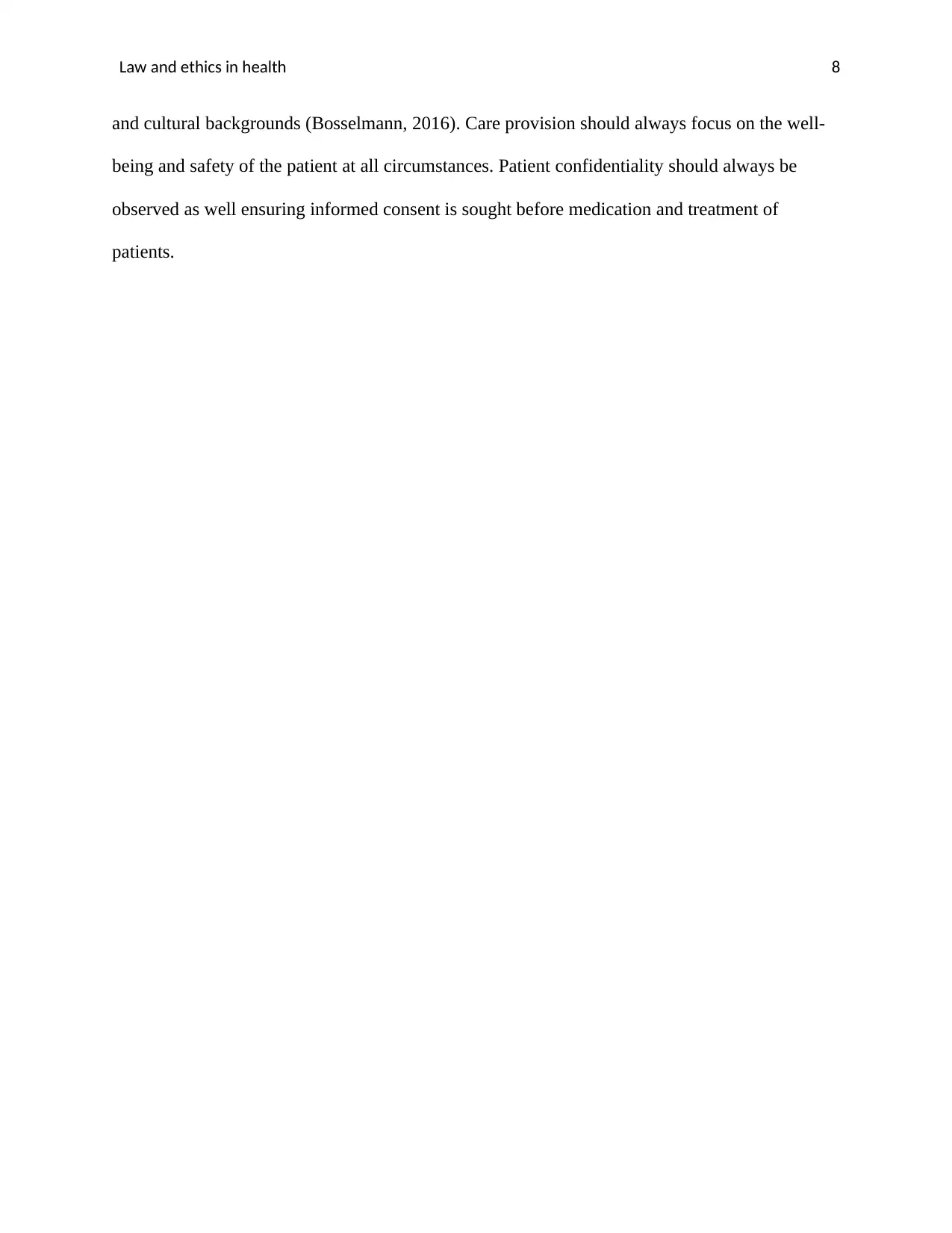
Law and ethics in health 8
and cultural backgrounds (Bosselmann, 2016). Care provision should always focus on the well-
being and safety of the patient at all circumstances. Patient confidentiality should always be
observed as well ensuring informed consent is sought before medication and treatment of
patients.
and cultural backgrounds (Bosselmann, 2016). Care provision should always focus on the well-
being and safety of the patient at all circumstances. Patient confidentiality should always be
observed as well ensuring informed consent is sought before medication and treatment of
patients.
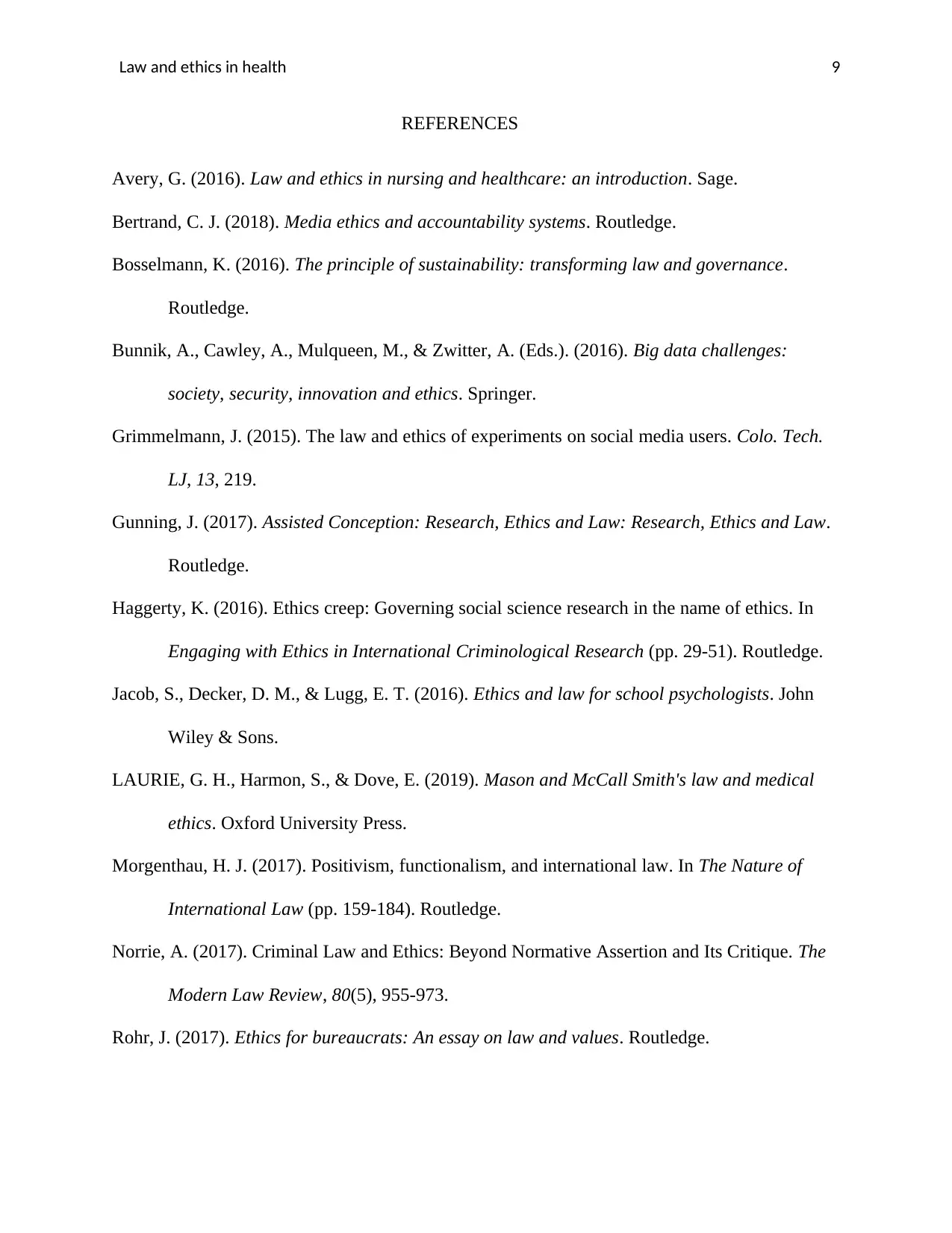
Law and ethics in health 9
REFERENCES
Avery, G. (2016). Law and ethics in nursing and healthcare: an introduction. Sage.
Bertrand, C. J. (2018). Media ethics and accountability systems. Routledge.
Bosselmann, K. (2016). The principle of sustainability: transforming law and governance.
Routledge.
Bunnik, A., Cawley, A., Mulqueen, M., & Zwitter, A. (Eds.). (2016). Big data challenges:
society, security, innovation and ethics. Springer.
Grimmelmann, J. (2015). The law and ethics of experiments on social media users. Colo. Tech.
LJ, 13, 219.
Gunning, J. (2017). Assisted Conception: Research, Ethics and Law: Research, Ethics and Law.
Routledge.
Haggerty, K. (2016). Ethics creep: Governing social science research in the name of ethics. In
Engaging with Ethics in International Criminological Research (pp. 29-51). Routledge.
Jacob, S., Decker, D. M., & Lugg, E. T. (2016). Ethics and law for school psychologists. John
Wiley & Sons.
LAURIE, G. H., Harmon, S., & Dove, E. (2019). Mason and McCall Smith's law and medical
ethics. Oxford University Press.
Morgenthau, H. J. (2017). Positivism, functionalism, and international law. In The Nature of
International Law (pp. 159-184). Routledge.
Norrie, A. (2017). Criminal Law and Ethics: Beyond Normative Assertion and Its Critique. The
Modern Law Review, 80(5), 955-973.
Rohr, J. (2017). Ethics for bureaucrats: An essay on law and values. Routledge.
REFERENCES
Avery, G. (2016). Law and ethics in nursing and healthcare: an introduction. Sage.
Bertrand, C. J. (2018). Media ethics and accountability systems. Routledge.
Bosselmann, K. (2016). The principle of sustainability: transforming law and governance.
Routledge.
Bunnik, A., Cawley, A., Mulqueen, M., & Zwitter, A. (Eds.). (2016). Big data challenges:
society, security, innovation and ethics. Springer.
Grimmelmann, J. (2015). The law and ethics of experiments on social media users. Colo. Tech.
LJ, 13, 219.
Gunning, J. (2017). Assisted Conception: Research, Ethics and Law: Research, Ethics and Law.
Routledge.
Haggerty, K. (2016). Ethics creep: Governing social science research in the name of ethics. In
Engaging with Ethics in International Criminological Research (pp. 29-51). Routledge.
Jacob, S., Decker, D. M., & Lugg, E. T. (2016). Ethics and law for school psychologists. John
Wiley & Sons.
LAURIE, G. H., Harmon, S., & Dove, E. (2019). Mason and McCall Smith's law and medical
ethics. Oxford University Press.
Morgenthau, H. J. (2017). Positivism, functionalism, and international law. In The Nature of
International Law (pp. 159-184). Routledge.
Norrie, A. (2017). Criminal Law and Ethics: Beyond Normative Assertion and Its Critique. The
Modern Law Review, 80(5), 955-973.
Rohr, J. (2017). Ethics for bureaucrats: An essay on law and values. Routledge.
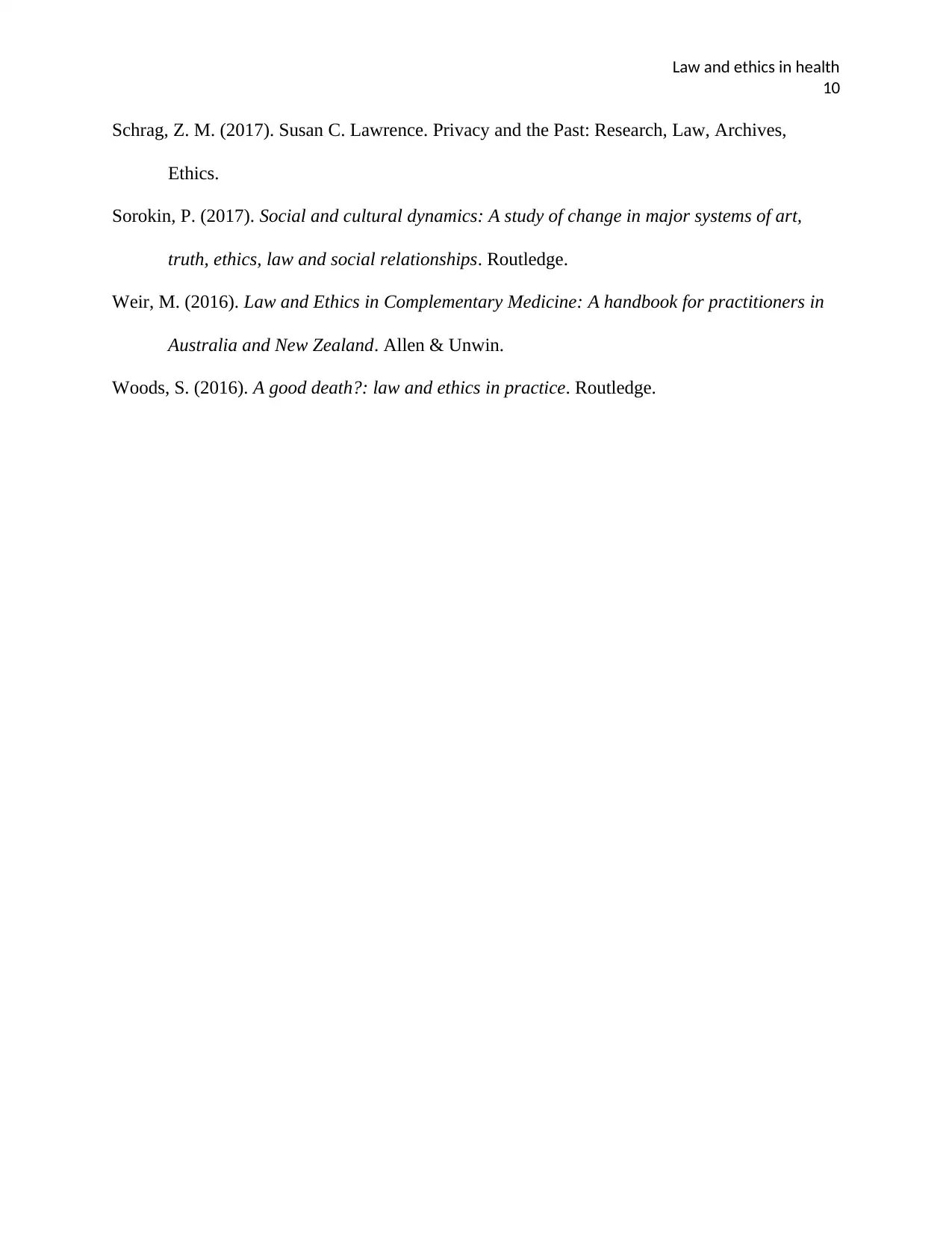
Law and ethics in health
10
Schrag, Z. M. (2017). Susan C. Lawrence. Privacy and the Past: Research, Law, Archives,
Ethics.
Sorokin, P. (2017). Social and cultural dynamics: A study of change in major systems of art,
truth, ethics, law and social relationships. Routledge.
Weir, M. (2016). Law and Ethics in Complementary Medicine: A handbook for practitioners in
Australia and New Zealand. Allen & Unwin.
Woods, S. (2016). A good death?: law and ethics in practice. Routledge.
10
Schrag, Z. M. (2017). Susan C. Lawrence. Privacy and the Past: Research, Law, Archives,
Ethics.
Sorokin, P. (2017). Social and cultural dynamics: A study of change in major systems of art,
truth, ethics, law and social relationships. Routledge.
Weir, M. (2016). Law and Ethics in Complementary Medicine: A handbook for practitioners in
Australia and New Zealand. Allen & Unwin.
Woods, S. (2016). A good death?: law and ethics in practice. Routledge.
1 out of 10
Related Documents
Your All-in-One AI-Powered Toolkit for Academic Success.
+13062052269
info@desklib.com
Available 24*7 on WhatsApp / Email
![[object Object]](/_next/static/media/star-bottom.7253800d.svg)
Unlock your academic potential
© 2024 | Zucol Services PVT LTD | All rights reserved.




